Sunday, 10 Aug 2008 (Quebec City).
Mr. Alan Kleinmann, from Old Bridge Public Library in the US, spoke about his library's Senior Spaces project (see also, seniorspaces.blogspot.com!)
The room was almost filled for this presentation organised by the Libraries Serving Disadvantaged Persons Section.
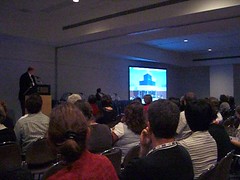
Alan said it was a clear indication that there's an interest in this area for years to come. And that the librarians are planning for their own service!
[Probably true. And from what I observe, mention 'Seniors' and you'd tend to attract more participants than if you mention 'Disability' in the programme title].
Alan mentioned that the shift in aging population happening all over the world (true, as cited in this presentation for my Davies Forum talk -- see slides 12 to 17).
At his library, they recognised that baby boomers working for past 20 to 30 years have not used libraries. Also, since there's a specific space for children, why not for seniors? (in fact, Children's spaces was not common in the early days of public libraries).
Hence their 'Senior Spaces' project, serving "all three generations of older adults—the baby boomers not yet retired, older adults who have retired in the last few years, and the elderly many who can no longer get to the library".
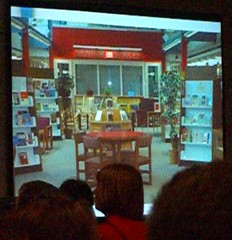
What is in this Senior Spaces
The Senior Spaces includes the physical aspect, programmes, meetings (among seniors), learning, a bookstore, "and more" (apparently they have gaming!)
Books remain at the focus of what they created. They have events like "Senior Fridays", a club called "Savvy Seniors" who plan outings for themselves.
There's an extensive large print collection with a Face Out shelving (Alan says the large print collection goes out like hot cakes).
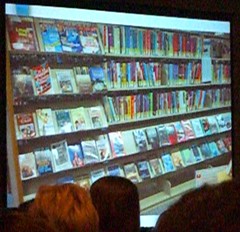
They have free computer classes for seniors. They want to use their libraries to help seniors bridge the digital divide (I totally agree with this approach).
They formed an advisory board comprising of two library board members and library customers. He says the advisory board suggested things which they wouldn't have thought about, like a Foreign Film club.
They teach users how to use the assistive software.
Another cool feature -- the librarian's desk is right smack in the Senior Spaces. Just a table and chair rather than an imposing service counter desk. This arrangement came out of necessity (lack of space) but it worked beautifully, according to Alan (and I would think so).
They have an active seniors club (I think this is the picture showing the Savvy Seniors, who organise their out outings).
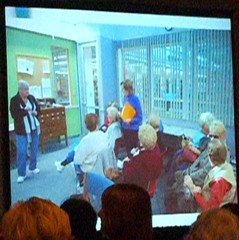
Gaming in library - for seniors
Alan showed this slide with a senior next to a young lady (talk about inter-generation!) The punch line was the lady's visually impaired. And with the Wii game set in the library, she played bowling for first time in 10 years.
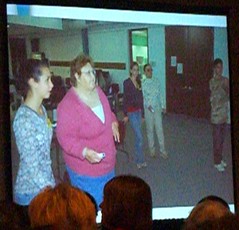
Here's another one that just says "inter-generation" as well.
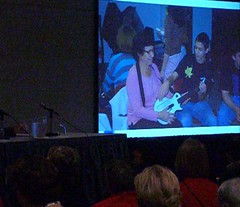
Promoting the service
They conduct outreach programmes (like this one to their Senior Center).
They use flyers.
There's a prominent wall to promote books that might attract baby boomers.
Here's a really nice idea -- a "Memory Case". Seniors contribute stuff from their past and showcase it in the library.
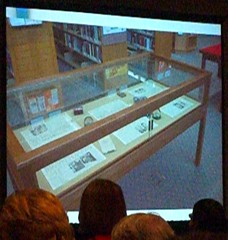
According to Alan, some seniors were so proud that they could do this so they got all their friends to come and told people about the library service.
They've gone into "Web 2.0 space", as in this blog with contributions from their users (like this post).
How they sought approval for the space
Alan explained that they incorporated the Senior Spaces proposal in their strategic plan, which was approved by their library board. They sought external funding in addition to what the board granted. They raised USD$30,000 but Alan emphasised that they were prepared to do the same with less money. They saved money by doing the space planning on their own.
Future plans
This includes more blogging activities, vodcasts, podcasts.
They plan to develop a presence in SecondLife. He sees their library's roles as teaching seniors technology (about YouTube, Web, Blogs).
Alan suggests that it's easy to create a Senior Spaces project in libraries. You just need a sign board to tell people the space exists, have the appropriate book display, and furniture.
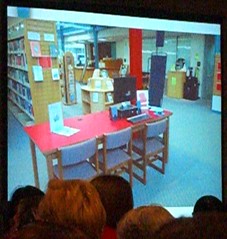
In ending, he says, "I hope you begin to think about democratic changes that are coming".
Q&A
Someone asked, "Will users mind being labeled as 'Seniors'?"
Alan says this issue is not clear cut. There are some who embrace the term and some who just refuse to use the service because of the name (to their loss). Old Bridge PL do have criticisms about the term Senior Spaces but it was their advisory board who adopted the name. They kept it because the seniors themselves couldn't come up with any better alternatives.
"How do you define a Senior?"
The US official definition is 65 but there's no clear cut benchmark even in the US. Alan jokes that their library considers the 50 to 70 year olds as "young seniors" and the Above-90 as "elderly".
My thoughts
In Singapore, the Toa Payoh library has a Seniors Corner. It's the only one with a clear demarcated physical space.
In comparing that one with Old Bridge PL's, it obvious to me now that the success of the space is more than just having a physical presence.
In fact, the physical aspect of the space did not come up very strongly in Alan's presentation, and yet he shared a very compelling story of his project.
So it's really about having a whole suite of activities -- programmes, customer involvement and empowerment, online and offline publicity and activities.
The key success criteria seems to be a strong group of regular seniors who use the space. And who readily identify themselves with the space.
It might be a challenge for Singapore libraries to try this. My feeling is that most of our seniors don't want to be in the limelight. They are from a generation whose thinking is that they'd rather remain in the background of things. For instance, something like the Memory Case may be difficult to try.
But having said that, I feel if we don't make the attempt to try, we won't know. For all I know, it could be a wrong perception on my part.
Definitely something I'd explore with my colleagues when I get back.
Alan's paper can be downloaded, here (PDF, 88KB).
[Next: Part 7]

No comments:
Post a Comment
Join the conversation. Leave a comment :)
Note: only a member of this blog may post a comment.